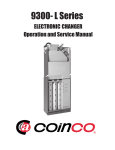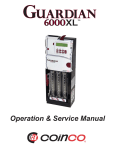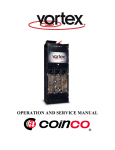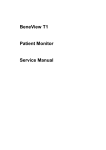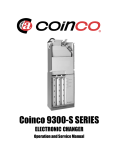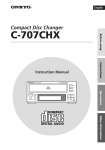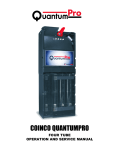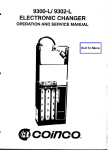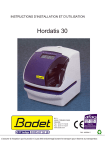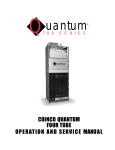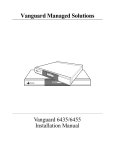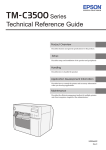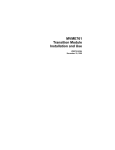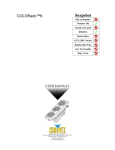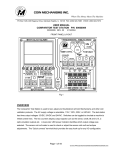Download Guardian 6000 Coin Changer Manual
Transcript
Operation & Service Manual TABLE OF CONTENTS SECTION 1: GENERAL INFORMATION Introduction Document Icons Naming Convention Dimensions & Specifications Dimensional Drawing 4 4 5 6 7 SECTION 2: INSTALLATION & SETUP Unpacking/Installing the Changerr Loading Coins Dispensing Coins Setting Float 8 10 11 12 SECTION 3: GENERAL CHANGER OPERATION Steady State User Display General Changer Operation Menu Navigation Menu Structure 13 1 13 15 1 15 1 SECTION 4: TYPICAL USAGE Parring the Guardian Setting Float Enabling/Disabling Overfill Paydown Float Paydown Audit Reporting Changing the Payout Coin Tube Configuration Cassette Configuration Eliminating a Slug Adding a Token Deleting a Token Token Change Value Token Change Routing Optimal Float Recomendations Service Recomendations 21 24 25 26 26 27 27 28 28 SECTION 5: ADVANCED CONFIGURATION Password Changing the Password Password Protection Levels Coin Enable Dual Currency Change Management Coin Security Level Language Clear Historical Audit Factory Reset Disable/Enable Audible Feedback 29 29 30 31 32 33 3 34 35 3 35 35 3 36 17 19 19 1 19 1 20 MDB Level 36 SECTION 6: MAINTENANCE Routine Maintenance Disassemblyy 37 37 SECTION 7: TROUBLESHOOTING Autotest Warning Messages Troubleshooting Matrix 42 43 4 45 4 SECTION 8: PARTS LIST Guardian 6000™ Housing & Payout Cassette Release Latch Assemblyy Guardian 6000™ Chassis Guardian 6000™ Payout Assembly Guardian 6000™Payout Cassette Assemblyy Guardian 6000™ Acceptor Assembly Front View w Guardian 6000 ™ Acceptor Assembly Back View w 46 47 4 48 4 49 50 51 3 SECTION 1: GENERAL INFORMATION Introduction This manual contains information on installing, operating and maintaining a Coinco Guardian 6000™ model coin changer. This manual is intended for owners, route operators and shop-level technicians as a primary source of information. Taking time to read this manual and become familiar with the information will help you obtain the best performance from your Coinco Guardian coin changer. Icons The following icons will guide you throughout the manual. Each icon highlights an area you may want to pay closer attention to. Indicates a checklist type of process that you can readily “check” as you proceed to the next step. Indicates a warning that you should adhere to. It is often accompanied by the words “DO NOT…” Product Overview and Features The Guardian 6000™ changer incorporates a wide range of benefits, including: • Six self-replenishing coin tubes with cash accountability. • Swing-out, illuminated payout cassette. • Built-in self diagnostics. • MDB (Multi-Drop Bus) interface (optional MDB to USB converter available). • Field tuning for tokens & slug elimination. • Interchangeable coin tubes enable simple payout re-configuration. • Full support of Guardian features and upgrades using the Coinco FP-5 Field Programmer For Your Records A label indicating the changer’s model number and serial number can be found on the side of the Guardian coin changer. Refer to the model number and serial number whenever you call your Coinco Service Center for information or service. The first four digits of the changer serial number indicate when the unit was built, which is also the beginning of the warranty period: • First two digits: indicate the week of manufacture. • Third and fourth digit: indicate the year. For example, serial number 1507000123 indicates the unit was manufactured in the 15th week of 2007. 4 STOP Indicates that this is a good time to pause, step back, and verify that everything is correct before proceeding further. Indicates a helpful hint or shortcut to simplify the task. Indicates frequently asked questions with their corresponding answers. i Indicates a possible issue dependent on the application and provides direction on how to correct the problem should it occur. SECTION 1: GENERAL INFORMATION Guardian 6000™ Naming Convention G6 X XX-XX Protocol X = MDB A = Protocol A Country Code US = United States CA = Canada Additional countries available. Payout Configuration Cassette ID BB BD BE BF Coin Denomination By Tube Position Country US A 25¢ US / Canada $1 Canada $2 Canada $2 B C D E F 10¢ $1 $1 $2 5¢ 25¢ 25¢ $1 5¢ 5¢ 5¢ 5¢ 25¢ 10¢ 25¢ 25¢ 25¢ 25¢ 25¢ 25¢ Please contact your Coinco Sales Rep for additional configurations. Models G6XUS-BB: Guardian 6000 six tube changer, MDB protocol, “BB” payout configuration (2 nickels,1 dime, 3 quarter tubes), for US market. G6XCA-BF: Guardian 6000 six tube changer, MDB protocol, “BF” payout configuration (1 nickel, 2 quarters, two $1 coin tubes, one $2 coin tube), for Canadian market. 5 SECTION 1: GENERAL INFORMATION Dimensions and Specifications Power Requirements: 20 to 42V DC 0.15 Amp average standby 0.6 Amp average operating 1.8 Amp max operating Operating Temperature 0°F to 150°F -18°C to 65°C Storage Temperature -22°F to 160°F -30°C to 72°C Relative Humidity 20% to 95% non-condensing Operating Attitude Vertical ±3° Shipping Weight in Carton Approximately 5 lbs. or 2.267 kilograms Figure 1 Controller/Vendor Interface G6X MDB Coin Changer Plug Connect Pin-out: Line 1 Line 2 Line 3 Line 4 Line 5 Line 6 6 34 VDC DC Power Return N/C Master Receive Master Transmit Communications Common 3X O .500 (12.70) 3X .250 (6.35) 2.690 (68.33) 5.367 (136.32) 2.390 (60.70) 13.200 (335.28) 4.490 (114.05) 3X O .211 (5.37) 1.538 (39.07) 3.032 (77.01) .600 (15.24) 2.249 (57.13) .473 (12.00) .921 (23.39) 1.300 (33.02) .487 (12.38) 3.150 (80.01) 1.003 (25.47) 5.557 (141.15) 5.467 (138.86) 3.052 (77.52) COIN PAYOUT AREA AND COIN RETURN AREA 2.410 (61.22) 2.569 (65.25) 1.320 (33.53) .767 (19.49) 1.450 (36.83) .238 (6.05) .320 (8.13) CASH BOX CHUTE AREA 14.000 (355.60) 3.170 (80.51) 7.755 (196.97) SECTION 1: GENERAL INFORMATION Dimensional Drawing inches (mm) Figure 2 7 SECTION 2: INSTALLATION & SETUP Unpacking / Installing the Changer After removing the coin changer from the shipping carton, inspect it for possible damage. If the unit is damaged, notify the shipping company immediately. The consignee (person or company receiving the unit) can file a claim against the carrier for shipping damage. We recommend you keep the original carton and packaging materials to reuse if you need to transport or ship the coin changer in the future. If the coin changer is being stored or used as a spare, always keep it in its shipping carton when not in use. This will keep it clean and offer the best protection for the unit. Installing the Changer 1. 2. 3. 4. 5. 6. 8 Remove power from the vending machine. DO NOT connect the changer harness to the vending machine with power connected. Remove the acceptor from the changer housing by pressing the acceptor latch (see Figure 4) on the front of the acceptor and pull the escrow lever towards you, away from changer housing. Disconnect the acceptor’s ribbon cable from the changer housing (see Figure 5). Lift the acceptor slightly to free the lower acceptor studs from the changer housing. Place the acceptor in a clean, dry area. Set the three mounting holes in the back of the changer housing over the mounting screws in the vending machine (see Figure 6). Tighten securely by hand. Re-install the acceptor by inserting the lower acceptor studs into the changer housing. Plug the acceptor ribbon cable into the changer housing. Press the top of the acceptor into the changer housing until the acceptor latch engages the changer housing. Verify the vendor’s coin return mechanism is adjusted to that the Acceptor gate is fully closed. There should be a small gap between the coin return mechanism and the changer escrow lever. Changer Components IRDA Link Acceptor Gate Escrow Lever LCD Display Acceptor Release Latch User Interface Keypad Sorting Door Acceptor Docking Cradle Coin Denomination Markings Payout Cassette Release Latch Sorting Door Latch External Data Port Graduated Tube Scales Swing-out Payout Cassette Access Figure 3 Escrow Lever Acceptor Release Latch Figure 4 SECTION 2: INSTALLATION & SETUP 7. STOP 8. 9. Plug the changer harness into the vending machine. Verify steps 1 to 7 are completed correctly. Apply power to the vending machine. The changer will power up, perform an auto-test of all systems, then the display will begin cycling in steady state mode. See Figure 7 . Figure 5 Power Up Sequence Figure 7 Typical User Display Messaging Guardian 6000 • Intro screen. SW: v0.1.1 MDB HW: v1 • Shows current versions of software and hardware. Checking Diagnostics • Performs self-diagnostics of systems. If there are errors, recommendations are given. Diagnostics OK • Self-diagnostics completed and all systems are functional. D05¢ E25¢ F25¢ A25¢ B10¢ C05¢ Float Mode Off Status: OK Tubes = $29.15 Loop Float Disabled Float Mode On Status: OK Tubes = $29.15 Loop Add $4.85 Float = $34.00 Steady State Mode See Figure 17 for an explanation of Steady State Mode messages. Note: Some Guardian models may show different messaging. Figure 6 9 SECTION 2: INSTALLATION & SETUP Loading Coins See Figure 10 for coin capacities. 10. Load coins into the changer the tubes using one of the following 3 options: • Using Swing Out Payout Cassette: Rotate the Payout Cassette Release Latch downward to open the coin Payout Cassette (See Figure 8). Pivot the Payout Cassette out of the changer housing to access the coin tubes (See Figure 9). Once the latch has been depressed, the Payout Cassette must be at least partially opened before it can be closed and reset properly. Fill the six coin tubes to the desired levels with the appropriate coins. Refer to the individual labels at the top of the tube determine which coin denominations go in each tube. • By Removing Cassette: The cassette can also be lifted out of the changer for loading coins. Open the Payout Cassette and swing it out, then lift the Payout Cassette straight up to remove it (See Figure 11). Load coins as described above. Reinstall the Payout Cassette by first positioning it on the upper pin, then align the lower pin and lower the cassette • To Load Front Tubes Only: Tubes A,B, and C can be hand loaded without opening the cassette. By pushing the Sorting Door Latch to the left and swinging open the Sorting Door (See Figure 12), you can load coins directly in tubes A, B, and C. NOTES: • Make sure all coins lay flat and fill each coin tube to be used with at least 5 coins. • For the most reliable operation, do not load coin tubes above the 100% level marking. • If not using all 6 tubes, leave all tubes installed and make sure to disable coin routing and coin level sensing for unused tubes. Use MENU/SETUP/CASSETTE/CUSTOM and set unused tubes to “---”. Figure 8 Payout Cassette Release Latch Figure 9 10 SECTION 2: INSTALLATION & SETUP Coin Tube Capacities Figure 10 Country US Canada Coin Type Max Coin Count 5¢ 10¢ 25¢ $1 5¢ 10¢ 25¢ $1 $2 Qty. 80 111 81 67 80 121 88 68 79 12. Drop a variety of coins into the changer to ensure proper operation. Basic keypad navigation is shown in Figure 14 and a coin payout mode summary in Figure 13. $ $4.00 $11.10 $20.25 $67.00 $4.00 $12.10 $22.00 $68.00 $158.00 Coin Payout Modes Manual Payout Normal Mode Payout one or more coins from a tube Keystrokes Hold down alpha key until desired coins are paid out. Auto Paydown Mode Payout ALL coins in a tube Figure 11 Figure 13 Pause / Resume Coin Payout Stop Coin Payout Keystrokes Hold down alpha key until at least 4 coins are dispensed. Press Escrow Lever. Press any key. Note: The last several coins in a tube can be paid out with individual button pushes. Does the changer pay out all coins from tubes or leave hidden coins? How are hidden coins reported? Figure 12 Sorting Door Latch As is typical with most changers, the Guardian leaves some hidden coins per tube (usually 3-5) to ensure incoming coins will always stack properly. These coins can be paid out in a manual payout mode. Hidden coins are not reported on MDB and are not available for change making. They are reported in audit information and are used in all tube scanning and float/par calculations. Figure 14 Right Arrow: Move across screen or selects current item. Up/Down Arrows: Shows options are available above & below “Audit”. Upper Level Menu: Current Menu: Lower case for this menu. Dispensing Coins Verify proper payout operation 11. Pay out at least two coins from each tube to ensure proper operation. Press each coin tube Inventory Button (See Figure 9) to dispense coins. MAIN MENU Audit ▲ ▼ Up Arrow: Scroll up in current menu. Left Arrow: Go back one menu level. Inventory Buttons (Letters): For coin tube or password actions. CANCEL: Exit out of operation, or go up one menu level. Down Arrow: Scroll down in current menu. ENTER: Select current item or accept/close operation. 11 SECTION 2: INSTALLATION & SETUP Setting Float (optional) Float Mode records and maintains a predefined level of coins in the tubes, and typically will maintain a lower level of change in the changer than if Float mode is not used. When using Float mode, an accepted coin will only be routed to the tube if one has been paid out. 13. You can quickly Enable Float at the current coin levels by simultaneously pressing the keypad hotkeys E+F. Then press ENTER to accept the displayed Float Value. 14. To disable or reset Float level, simultaneously press keypad hotkeys D+F to Disable Float. Adjust the coin levels and repeat step 12 above. When I add coins prior to resetting my float level, the changer automatically kicks coins out. Why? Overfill Paydown automatically returns any coins that exceed the Float Mode level. Any coins added to the coin tubes after parring, or adding coins prior to setting a higher Float level will result in these extra coins being sent to the coin return. See Step 14 above for how to Disable Float. Figure 15 1. 2. 3. 4. 5. Setting Float Push D+F to Disable Float. Open cassette and load desired level of coins for float. Close cassette and wait for steady state operation (cycling display). Push MENU button. Press E+F to Enable Float. Or, scroll using arrow keys to the screen below Cancel SETUP Float 12 ▲ Enter ▼ FLOAT ▲ Enter Set Float ▼ ▲ Scroll ▼ FLOAT ▲ Enter Disable Float ▼ Scroll ▲ ▼ FLOAT ▲ Overfill Paydn ▼ Scroll ▲ ▼ FLOAT ▲ Float Paydn ▼ Scroll ▲ ▼ Scanning Tubes Float Disabled Float = $XX.XX CANCEL or ENTER Enter Float Set To $XX.XX Changer Steady State Mode SECTION 3: GENERAL CHANGER OPERATION Steady State User Display During steady state operation, the user display will show one of four typical screens as shown in Figure 16. Steady State Operation Display Messages Figure 16 Fully Functional Changer Problem Option 1: 1 Float Enabled Option 3: Warning Status: OK Tubes = $29.15 Loop Add $4.85 Float = $34.00 • $29.15 change in tubes. • Float set at $34.00. • Add $4.85 to Par changer. Option 2: 2 Float Disabled Status: OK Tubes = $29.15 Loop Float Disabled • $29.15 change in tubes. • Float mode not used. General Changer Operation Acceptor Module The Acceptor Module contains the majority of the Guardian’s control logic. The Acceptor can electronically validate up to 32 different coin types and actively route accepted coins to any of six coin tubes or to the vending machine cashbox. A LCD display provides visual feedback on the functioning condition of the changer. Six inventory buttons allow the user to manually dispense coins from the coin tubes. The MENU button allows access to enter special programming and features. The Acceptor Module transmits credit and status information and receives payout and control information from the vending machine. The Acceptor monitors each coin tube to know when it is full so any additional coins can be routed to the Status: Warning Tubes = $29.15 Loop Float Disabled Loop Warn 1: Clean Acceptor • Warning(s) & recommended user action(s) displayed. Option 4: Out of Service Out of Service • Changer non-operational and requires immediate attention. Coin Acceptance Deposited coins enter the coin inlet funnel, where they are directed down a coin rail formed by the mainplate and acceptor gate. Optical and magnetic sensors positioned along the rail validate the coins. When the coin reaches the end of the coin rail, motor and solenoid-operated coin doors direct the coins to either the coin tubes, cashbox or to the coin return chute. Pressing the escrow lever physically opens the acceptor gate, allowing bent coins and foreign materials to fall into the coin reject chute. Movement of the front gate is also detected by the coin changer electronics and is communicated to the vending machine controller causing any customer credit to be paid back. If coins are deposited too closely together (fast feed), one or more coins may be rejected if the 13 SECTION 3: GENERAL CHANGER OPERATION Coin Tube Cassette The coin cassette contains the six coin tubes that store coins for change payout. The front and back halves of the cassette hinge together to form the coin return chute. Rejected coins from the acceptor pass through the center of the cassette assembly and fall out the bottom of the coin changer. Accepted coins are guided into the coin tubes. Payout Module The bottom of the Guardian changer is the Payout Module. Coins stored in the coin tubes of the cassette are dispensed by the payout modules motor driven belt. The belt has two pins attached to it, which engage a sweeper at the bottom of each coin tube. When the sweeper is engaged, one coin is released from the coin tube. The acceptor module sends information to the payout module for dispensing coins from the cassette. Pulse-Echo Coin Sensing Techonology RETURN Housing Module The Housing Module consists of the changer housing, MDB harness and changer board. The backside of the housing has three mounting holes for attaching the Guardian changer to the vending machine. The cashbox coin chute is also part of the housing. Coin Level Sensing The Pulse-Echo coin level sensing method emits and detects sound waves. The number of coins is calculated by the amount of time it takes the emitted sound wave to deflect off the coin stack and return to be detected. (See Figure 17) EMIT acceptor cannot safely route them to the appropriate coin tube. When any object (coin, counterfeit coin, etc.) is rejected, the changer will temporarily delay coin validation to allow the rejected object to exit the changer. Figure 17 How often does the changer scan the tubes? The Guardian will automatically scan after any coin deposit or payout. It will also scan after any “change in state”, e.g. when the payout cassette or sorting door is opened then closed. I added one coin to a tube and the coin level sensing did not detect it. Why? The Pulse-Echo coin level sensing method is accurate to within ±2 coins. It may not necessarily detect a difference when a single coin is added. This is normal and is within the technology’s margin of error. Does the Guardian require tube sensing calibration as with other models? No, it does not require any calibration to attain its level of accuracy. 14 SECTION 3: GENERAL CHANGER OPERATION Menu Navigation The following views summarize menu navigation for the Guardian 6000 changer: • General menu navigation and keypad functionality is shown in Figure 13. • The special “hotkeys” to streamline key operations are shown in Figure 18. Figure 18 (any individual alpha key) Guardian “Hotkeys” :Displays coin denomination and quantity for the selected tube (A-F). Also used for manual payout. (1 push): Accesses Main Menu. (2 pushes): Begins Audit Current Data reporting. + + + + : Establishes float at current change level. : Disables Float mode. : Shows Payout Cassette coin configuration. : Initiates Float Paydown (if enabled). Menu Structure The main menu consists of three primary functions: 1) Audit capabilities 2) Changer Setup, and 3) Recommendations. The overall menu layout is shown in Figure 19. This figure is also your guide showing where each menu topic is reviewed in this user manual. Figure 20 shows more information specifically on the Setup menu. What happens if I do not complete a programming change and walk away mid-stream? For safety purposes, the Guardian times out if a programming step is not completed. It will then default to the prior settings. 15 SECTION 3: GENERAL CHANGER OPERATION Figure 19 Menu Structure Main Menu Audit Current ……………………..page 20 Clear Current ………...……. page 20 Setup Float Cassette Coin Config Field Tune See Figure 21 for additional information General Scroll within menu Scroll up / down using arrow keys Historical …….…………… page 20 Password Recommendations Optimal Float …………….. page 28 Service ……...…………….. page 28 Scroll up / down using arrow keys Setup Menu Float Cassette Coin Config Field Tune General Password 16 Setup Menu Structure Set Float …...……...page 12 Figure 20 Disable Float …......page 12 Set / maintain predefined coin level. Turn off Float Mode. Overfill Paydn …....page 19 Enable (default) / disable Overfill Paydown. Float Paydn………..page 19 Enable / Disable (default) Float Paydown. Standard …..............page 24 Custom …................page 24 Assign coin routing for standard cassette. Assign coin routing for custom configuration. Coin Enable ….........page 31 Change Mgmt …......page 33 Security Level ……..page 34 Determine which coins are accepted. Set change paying algorithm. Enable Standard or High Security by coin. Token Add …...........page 26 Token Delete ….......page 26 Token Chg Value …page 27 Token Chg Rtg ……page 27 Slug Remove ..........page 25 Add token, assign value and routing. Delete previously loaded token. Change token value. Change routing (coinbox, coin return tube). Block a slug from being accepted. Autotest …..............page 42 MDB Settings …......page 36 Dual Currency …....page 32 Language …............page 35 Clear Hst Audit …...page 35 Factory Reset ….....page 35 Sound ….................page 36 Run autotest for changer troubleshooting. Change MDB Level for changer communications. Accept coins from two countries & which go to tubes. Set baseline language. Delete Audit Historical data. Return changer to factory settings. Disable/Enable changer audible feedback. Chg Password …....page 29 Password Level …..page 29 Change user password. Change password protection level for menu. SECTION 4: TYPICAL USAGE Now that you’ve installed and completed the basic setup of your Guardian 6000™ changer, this section will review typical route operations. More detailed setup capabilities are detailed in Section 5. Parring the Guardian Parring is the action of bringing the changer back to its original float level. This can be accomplished either via the Guardian’s automated parring system (when Float has been set by the user), or visually when Float has not been set. 1. Automated Parring System: The simplest way to par is by using the Guardian’s automated parring recommendations. See Figure 21 for details. If coins only need to be added to the front tubes, the Sorting Door can be opened instead of the payout cassette. Otherwise, everything else is the same in Figure 21. 2. Manual or Visual Parring: The Guardian can also be parred visually by refilling the tubes to the approximate levels. This can be accomplished either by using the tube markings, or by using the optional Guardian adjustable par rings. The Manual or Visual Parring methods are only to be used when Float Mode is disabled. • Open the payout cassette (all tubes) or sort door (front tubes only) and load coins to the desired tube level marking to the parring level. • Par rings can be adjusted to the desired level by sliding them up or down on the tubes. 17 SECTION 4: TYPICAL USAGE Automated Parring Routine Note: Float must be set to use this capability. 1. Depress cassette release lever. 2. Swing payout cassette open. D05¢ E25¢ F25¢ A25¢ B10¢ C05¢ • Current tube configuration when cassette release lever depressed. Insert Coins to PAR changer… Loop • Insert a combination of coins that equals the displayed value ($4.85 in this example). Add $4.85 Close payout cassette. Checking System • Guardian verifies status of all systems. Diagnostics OK • System check status reported. Any problems would be noted. Scanning Coin Counts • Coin tubes are scanned for updated levels. Overfill Paydown CANCEL to Stop Par Complete Changer Steady State Mode • If too many coins are added, excess coins are paid out automatically. The Overfill Paydown feature can be disabled. • Par routine is complete. • Steady state mode “Tubes = “ displays updated coin levels. Figure 21 18 SECTION 4: TYPICAL USAGE Setting Float (optional) See Section 2: Installation & Setup. Enabling / Disabling Overfill Paydown When the changer is in Float Mode, the Overfill Paydown feature causes the changer to pay out any coins in excess of the Float level that are inserted during parring. Overfill Paydown is defaulted to “on” in the standard changer setup. See Figure 22 for how to turn this feature on or off. Disabling / Enabling: Overfill Paydown & Float Paydown 1. Push MENU Button. 2. Scroll using arrow keys to screen below Enter for SETUP Float ▲ Enter ▼ FLOAT Set Float OVERFILL PAYDN ▲ “ON” ▲ ▼ Enable Scroll ▲ Scroll ▲ ▼ ▼ FLOAT Disable Float Scroll ▲ ▼ FLOAT Overfill Paydn Enter for OVERFILL PAYDN ▲ “OFF” ▲ ▼ Disable ▼ Changer Steady State Mode Scroll ▲ ▼ ▲ ▼ Enter Scroll ▲ ▼ FLOAT Float Paydn ▼ Enter for FLOAT PAYDN Enable Enter Scroll ▲ ▼ ▲ “ON” ▼ Scroll ▲ ▼ FLOAT PAYDN Disable Scroll ▲ ▼ Enter for ▲ “OFF” ▼ Changer Steady State Mode Figure 22 Float Paydown When the changer is in Float Mode, the Float Paydown feature causes the changer to route all accepted coins to the tubes until they are full; the balance then go to the cashbox. Float Paydown is commonly used to ensure the maximum change making capability is always available without having to manually fill the changer during the route visit. Float Paydown is defaulted to “off” in the standard changer setup. See Figure 22 for how to turn this feature on or off. 19 SECTION 4: TYPICAL USAGE Audit Reporting The Guardian features a means of tracking and reporting all sales. Audit data consists of two types of data: 1) Current Data, and 2) Historical Data. 1. Current (Resettable) Data: consists of changer data stored since the last user reset. See Figure 23 for details. The user can quickly begin Audit Current Data reporting by pushing MENU twice. Refer to Figure 18 for additional information on changer hotkeys. 2. Clear Current (Resettable) Data: Clears all changer data since the last user reset. Current data can be cleared at any time. See Figure 23. How are ‘Exact Change Losses” calculated? Historical sales activity is used to calculate lost sales when in the exact change mode. How are ‘Total Sales’ quantities and dollar values calculated? Every transaction where coins are accepted at or above the predefined vend price equates to a quantity of one sale. The sum of these sales is the total sales in dollars. Figure 23 1. Audit Reporting / Clear Current Data Scroll using arrow keys to screen below MAIN MENU Audit ▲ Enter ▼ AUDIT Current ▲ ▼ Enter Scroll ▲ Scrolls automatically…. Cash to Cashbox = $53.75 ▼ AUDIT Historical ▲ ▼ Enter ▲ ▼ Enter Scroll ▲ ▼ AUDIT Clear Current Scroll ▲ ▼ Cash to Tubes = $23.15 Change Dispensed = $25.45 Manual Dispense = $2.35 Total Sales Qty = 83 Navigation Keys – Within Audit ENTER = Pause / Resume. ▲ = Scrolls within screens. ▼ 20 Token Sales Qty = 4 Exact Chg Sales Qty = 1 Total Sales = $83.00 Exact Chg Sales = $1.25 Exact Chg Losses = $4.15 Time in Exact Chg = 5% End Audit Total Coins Paid Qty = 132 Coins Accepted Qty = 456 Changer Steady State Mode SECTION 4: TYPICAL USAGE 3. Historical Data: consists of data stored since the changer was first put in service. Audit Historical Data displays the same categories of data as Current Data, the totals will just be from the beginning of the changers service life. See Figure 23 for details. Historical Data can also be reset for extreme cases where the user does not want their sales data to be revealed; e.g. changer is being sold, etc. See Figure 44 for more information. Changing the Payout Coin Tube Configuration Your Guardian will typically incorporate a Standard Cassette configuration (See Figure 24). The Guardian features the capability of changing individual tubes within the payout cassette. The Guardian coin tube locations are designated as shown in Figure 25. Guardian 6000™ Standard Cassettes Cassette ID BB BD BE BF Coin Denomination By Tube Position A Country US 25¢ US / Canada $1 Canada $2 Canada $2 B C D E F 10¢ $1 $1 $2 5¢ 25¢ 25¢ $1 5¢ 5¢ 5¢ 5¢ 25¢ 10¢ 25¢ 25¢ 25¢ 25¢ 25¢ 25¢ Please contact your Coinco Sales Rep for additional configurations. Figure 24 Payout Cassette - Coin Tube Position Designations D E F Coin Return A B C Changer Top View Figure 25 21 SECTION 4: TYPICAL USAGE Payout Cassette - Coin Tubes & Positions $2 $1 25¢ 5¢ 10¢ Tube #1 Tube #2 Tube #3 Tube #4 Tube #6 AB ABC ABCDEF ABCDEF ABCDE Coin NA US $1 US 25¢ US 5¢ US 10¢ Tube Assy # / Shim Color NA 408832-1 Lt. Gray 408833-1 Blue 408834-1 Blue 408836-1 Red Possible Tube Positions US Canada Coin CAD $2 CAD $1 CAD 25¢ CAD 5¢ CAD 10¢ Tube Assy # / Shim Color 408831-1 Black 408832-1 Lt. Gray 408833-2 Black 408834-1 Blue 408836-2 Gold Note: Coin tube numbers (e.g. Tube #2) are marked on the back of the tube by the shim attach point. Changing the Coin Tubes There are 5 different tube sizes for the North American market. Quarter and nickel tubes can be placed in any of the six payout positions (See Figure 25). Tubes for dimes, $1 and $2 coins have restrictions on their placement. Please refer to Figure 26 for details. Each coin tube will require a specific coin shim in order to accurately pay out that coin thickness. Please refer to Figure 26 to ensure the correct coin shims are installed. 1. Rotate the Payout Cassette Release Latch downward to open the coin payout cassette. Refer to Figure 27. 2. Pivot the payout cassette out of the changer housing by pulling on its lower right corner (See Figure 28). Once the latch has been depressed, the payout cassette must be at least partially opened before it can be closed and reseated properly. 3. Lift the cassette straight up to remove it from the coin changer (See Figure 29). 4. To remove an individual coin tube, hold the cassette assembly then gently pull the top of the coin tube forward to unsnap the top of the tube. See Figure 30. 5. Tilt the top of the tube away from the cassette and lift the tube out. 22 6. 7. Figure 26 See Figure 31. Install the replacement coin tubes and shim assembly by first inserting the bottom of the tube in the cassette, then pivot the top of the tube and snap it into the upper part of the cassette. Check that all coin tubes are secured to the cassette. Reinstall the payout cassette into the housing. Programming the Coin Routing Whenever the coin tubes are changed, the Guardian must be reprogrammed to route coins to the new tube locations. See Cassette Configuration - Using a Custom Configuration. Payout Cassette Release Latch Figure 27 SECTION 4: TYPICAL USAGE Figure 30 unsnap Figure 28 Figure 31 Figure 29 23 SECTION 4: TYPICAL USAGE Cassette Configuration Cassette configuration assigns which coins route to which payout tubes. Your new Guardian changer will already be configured for the factory cassette and coin routing. This step of changing the cassette configuration is only necessary if: • a payout cassette has been replaced with a cassette containing different coin tubes, or coin tubes in different positions. • individual coin tubes have been replaced (or moved). There are two ways to assign coins: 1) Using a Standard Cassette, or 2) Using a Custom Configuration. 1. 2. Using a Standard Cassette: Figure 24 shows the Standard Guardian payout configurations. If you are using a Standard cassette, find the cassette configuration designation (such as BB, BD, etc. in Figure 24) and proceed to Figure 31 to enter this cassette configuration. The Using a Custom Configuration: a custom configuration is any combination of tubes and/or coin routing other than what is shown in Figure 25. If you want to reconfigure the payout tube configuration and have not already done so, please refer to Changing the Payout Coin Tube Configuration before proceeding. After this has been done, you will need to reconfigure the coin routing. See Figure 32 below. If you do not plan to use all 6 coin tubes, leave tubes installed and make sure to disable coin routing and coin level sensing for the appropriate tubes. This is done by entering “---“ when assigning coins; see Figure 32 below for an example. i On some Vendo and Dixie-Narco machines, certain changer setup modifications (tube reconfiguration, changing coin routing, token additions/deletions) may not be recognized. If this occurs, cycle power to the main controller board to correct the problem. Tokens cannot be routed to tubes using the Custom Cassette menu. The Token Routing menu should be used. Changing Cassette / Tube Configuration 1. 2. Push MENU button. Scroll using arrow keys to screen below SETUP Input Standard cassette designation ▲ ▼ Cassette Shows configuration for entered cassette. Enter CASSETTE Standard Scroll ▲ ▼ CASSETTE Custom Scroll ▲ ▼ ▲ Enter Standard ▼ Cassette I.D. BB ▲ Enter Select Tube(s) ▼ & Assign Coin Enter D05¢ E25¢ F25¢ A25¢ B10¢ C05¢ ◄ ►Assign Tubes; ▼▲ Assign Coins To Accept Press ENTER D25¢ E25¢ F- - A25¢ B05¢ C10¢ Loop Select tube by using Right/Left arrows; Select coin for each tube by scrolling using Up/Down arrows. Scrolling to & selecting “- - -” will disable coin routing and tube scanning for that position 24 Loop To Accept All Press ENTER Enter Changer Steady State Mode Enter Figure 32 SECTION 4: TYPICAL USAGE Eliminating a Slug Slugs are counterfeits or foreign coins that are used by thieves to gain credit for a higher value domestic coin. The Guardian enables simple blocking of slugs while the changer is still on site. Slugs can easily be blocked by completing the simple field tune in Figure 33. You will need at least one sample of the slug to be blocked to tune the changer. Eliminated slugs can be routed to the cashbox to prevent thieves from re-using them. Figure 33 Eliminating A Slug 1. Push MENU button. 2. Scroll using arrow keys to screen below SETUP Field Tune Dropping 10 examples gives better accuracy. ▲ ▼ Drop 10 Times Enter FIELD TUNE Token Add Scroll ▲ ▼ FIELD TUNE Token Delete Scroll ▲ ▼ FIELD TUNE ▲ ▼ ▲ ▼ ▲ Token Chg Value▼ Scroll ▲ ▼ FIELD TUNE ▲ Token Chg Rtg ▼ Scroll ▲ ▼ FIELD TUNE ▲ Slug Remove ▼ Enter Scroll ▲ ▼ Decrements to 0. Drop 9 Times Tune Established Drop Complete Cash Box Scroll ▲ ▼ ▼ Slug Removed SLUG ROUTING▲ Coin Return Scroll ▲ ▼ Creating Tune Success Failure SLUG ROUTING▲ Enter ▼ Enter Changer Steady State Mode Tune Failure. Redrop 25 SECTION 4: TYPICAL USAGE Working with Tokens The Guardian 6000™ features a wide range of token capabilities all of which can be accomplished while the changer is still on location. These capabilities are covered here. All token capabilities listed in this section can also be accomplished using the Coinco FP-5 Field Programmer. Adding A Token Enables acceptance of a token. Tokens can easily be added while the changer is still on site by completing the simple field tune in Figure 34. If free value tokens are routed to tubes, the user must ensure the proper tube/shim combination is used to allow reliable token payout. Please contact Coinco with token diameter and thickness measurements for a coin tube/shim suggestion i On some Vendo and Dixie-Narco machines, certain changer setup modifications (tube reconfiguration, changing coin routing, token additions/deletions) may not be recognized. If this occurs, cycle power to the main controller board to correct the problem. Adding / Deleting A Token 1. Push MENU button. 2. Scroll using arrow keys to screen below SETUP Field Tune ▲ ▼ Tune Established Drop 10 Times Assign Name Enter FIELD TUNE Token Add Scroll ▲ ▼ FIELD TUNE Token Delete Scroll ▲ ▼ FIELD TUNE ▲ ▼ Enter ▲ Enter ▼ ▲ Token Chg Value▼ Scroll ▲ ▼ FIELD TUNE ▲ Token Chg Rtg ▼ Scroll ▲ ▼ FIELD TUNE ▲ Slug Remove ▼ Scroll ▲ ▼ Figure 34 Decrement Count Scroll ▲ ▼ Assign Value Drop Complete Enter ▲ Enter TOKEN VALUE ▲ • Options: Free to $9.95. ▼ ▼ TKN=FREE Scroll ▲ ▼ Assign Route Creating Tune Success Scroll ▲ Failure Tune Failure. Redrop Other tokens loaded Delete Token TKN 0 ▼ ▲ • Options are: 0 to 9. ▼ • Default is next available. ▲ Enter TKN 0 ▼ Enter ▲ Enter TOKEN ROUTING ▲ ▼ ▼ Coin Return Enter Scroll ▲ ▼ TOKEN ROUTING ▲ ▼ Cash Box Enter Scroll ▲ ▼ • Option of Tubes only if TOKEN ROUTING ▲ Token Value = FREE. ▼ Tubes • Must then assign tube. Enter Scroll ▲ ▼ Field Tune Complete ▲ Enter Token Deleted ▼ No other tokens Changer Steady State Mode Deleting a Token Allows the user to block acceptance of a previously tuned token. See Figure 34 for how to delete a token. On some Vendo and Dixie-Narco machines, certain changer setup modifications (tube reconfiguration, changing coin routing, token additions/deletions) may not be recognized. If this occurs, cycle power to the main controller board to correct the problem. i 26 SECTION 4: TYPICAL USAGE Token Change Value Change the value of a previously tuned token. A token that is currently valued as “FREE” and routed to the changer tubes cannot be revalued without first changing the routing to “Cashbox” or “Coin Return.” See Figure 35 for how to change token value. Token - Change Routing / Change Value 1. Push MENU button. 2. Scroll using arrow keys to screen below SETUP Field Tune ▲ ▼ Enter FIELD TUNE Token Add Scroll ▲ ▼ FIELD TUNE Token Delete Scroll ▲ ▼ FIELD TUNE Allows scrolling if more than one token is loaded. ▲ ▼ TOKEN CHG RTG ▲ Enter ▼ TKN 0 TOKEN ROUTING ▲ Coin Return Scroll ▲ ▼ ▲ ▼ Cash Box ▼ Scroll ▲ ▼ ▲ Enter TOKEN ROUTING ▲ Tubes ▼ Scroll ▲ ▼ ▲ ▼ Enter ▲ ▼ Enter TOKEN ROUTING ▲ Token Chg Value▼ Scroll ▲ ▼ FIELD TUNE Token Chg Rtg Scroll ▲ ▼ FIELD TUNE Slug Remove Scroll ▲ ▼ ▼ • First screen shows current setting. • Scroll to desired choice and ENTER ▼ Allows scrolling if more than one token is loaded. Enter TOKEN VALUE ▲ ▼ TKN=FREE TOKEN CHG VALUE ▲ Enter TKN 0 • Option of Tubes only if Token Value = FREE. • Must then assign tube. • Options: Free to $9.95. • Initial value is current. Figure 35 Token Change Routing Change the routing of a previously tuned token. See Figure 35 for how to change the routing for a token. If free value tokens are routed to tubes, the user must ensure the proper tube/shim combination is used to allow reliable token payout. Please contact Coinco with token diameter and thickness measurements for a coin tube/shim suggestion. 27 SECTION 4: TYPICAL USAGE Recommendations Optimal Float This section offers helpful advice on getting the most out of your Guardian 6000™ changer. The Guardian 6000™ tracks a wide variety of usage data to support the audit reporting feature. This same data is used to develop the recommendations discussed in this section. There is no better data than that from your specific installation to help optimize changer operation. The Recommendations section includes 1) Optimal Float, and 2) Service. Displays the recommended Float level for the changer based on the last 60 days of changer usage. The Optimal Float recommendation is based on the most recent changer activity and thus will vary slightly over time based on day-to-day transactions. To minimize the Exact Change condition and maximize machine sales, it is recommended that Optimal Float be checked every month or so. The user can then update the Float setting to obtain the optimal changer performance. See Figure 36 for how to obtain the Optimal Float Recommendation. Service Will automatically make a Service recommendation based on changer usage. See Figure 36 for how to check for Service Recommendations. Figure 36 1. Recommendations Scroll using arrow keys to screen below Shows current Float setting and recommended Optimal Float setting based on recent changer usage. MAIN MENU ▲ Recommendations ▼ Enter RECOMMENDATIONS ▲ Enter Optimal Float ▼ Float = $XX.XX Optimal = $YY.YY Scroll ▲ ▼ RECOMMENDATIONS ▲ Enter Service ▼ Recommend Coinco Clean & Test Scroll ▲ ▼ 28 Service Recommendations will only be shown if the changer has had significant usage levels. Changer Steady State Mode SECTION 5: ADVANCED CONFIGURATION Advanced Configuration This section explains the lesser-used features of the Guardian 6000™ changer. Password The password section protects the more sensitive changer information. Entering the Password A password must be entered any time the user attempts to enter a password-protected area of the menu. These include the Password area of the Setup menu, as well as the areas defined by the Password Protection Level (see below). The basics of Password operation are as follows: 1. The default Password for most changer configurations is D-E-F-B. 2. The CANCEL button allows you to back up while typing the password, or to back out of the Password screen entirely. 3. Once the correct password is entered, it allows access to the user’s original destination. 4. There is no penalty for multiple incorrect password attempts; i.e. the screen does not lock out access to non-password protected items. Changing the Password Passwords can easily be changed from the default. Valid passwords are four characters and are any combination of the letters D, E, F, and B (the four arrow keys). See Figure 37 for how to change the password. If the password has been changed from the standard D-E-F-B, and the user cannot remember what it is, the Password can be reset by using the Coinco FP-5 Field Programmer. Password / Change Password & Level 1. Push MENU button. 2. Scroll using arrow keys to screen below SETUP Password ▲ ▼ Cancel PASSWORD Chg Password Enter Incorrect Incorrect Password ▲ ▼ ▲ Enter ▼ Password = FEED CANCEL or ENTER Enter Correct Scroll ▲ ▼ PASSWORD Password Level Scroll ▲ ▼ First screen shows current setting. Scroll to desired Level and ENTER ▲ Enter PASSWORD LEVEL ▲ ▼ LEVEL 1 ▼ Scroll ▲ ▼ PASSWORD LEVEL ▲ LEVEL 2 ▼ Scroll ▲ ▼ PASSWORD LEVEL ▲ LEVEL 3 ▼ Scroll ▲ ▼ Cancel Enter Password ____ ▲ Enter Enter Password ▼ FEED Changer Steady State Mode Enter Enter LEVEL = LEVEL X CANCEL or ENTER Figure 37 29 SECTION 5: ADVANCED CONFIGURATION Password Protection Levels Password Protection Levels allow the user to decide which information is protected by a password. The Guardian features three levels of password protection: • Level 1: The default, or lowest level of security. • Level 2: Adds Field Tuning and the entire Setup-General sections of the menu. • Level 3: Adds Float, Cassette Configuration, and Coin Configuration. See Figure 41 for a visual representation of the Password Protection Levels. Figure 38 shows how to change the level. Password Protection Levels LEVEL 3 LEVEL 2 LEVEL 1 (default) All Password Items • Password Level • Change Password • Factory Reset • Clear Hist Data Adds: Adds: Field Tune General Float Cassette Coin Config Increasing Security Figure 38 30 SECTION 5: ADVANCED CONFIGURATION Coin Enable Coin Enable allows the user to select which coins are and are not accepted within the standard coin set for the country. See Figure 39 for enabling and disabling acceptance of coins within the standard coin set. The standard coin set for the country is determined by the changer “Country Code”. See the Guardian Naming Convention (page 5) to determine the Country Code of the changer. Figure 39 Coin Enable 1. Push MENU button. 2. Scroll using arrow keys to screen below SETUP Coin Config ▲ ▼ Enter COIN CONFIG Coin Enable Scroll ▲ ▼ COIN CONFIG Change Mgmt Scroll ▲ ▼ COIN CONFIG Security Level Scroll ▲ ▼ ▲ Enter Select Coins to Enable / Disable ▼ Display shows current status for each coin. ◄ ► Select Coin; ▲▼ Disable Coin US25¢E US$1 D US5¢ E US10¢E Loop ▲ ▼ To Accept All Press ENTER Enter Changer Steady State Mode 31 SECTION 5: ADVANCED CONFIGURATION Dual Currency Allows coins from two countries to be accepted by the changer, and allows the user to set the routing (cashbox or coin tube) for the coins. See Figure 40 for how to enable acceptance of more than one country set of coins. If Dual Currency is enabled, then you must select which coins are routed to the coin tubes and which are routed to the cashbox. Figure 40 shows how to set which country set is routed to the coin tubes; the other country’s coins are automatically routed to the cashbox. Dual Currency / Coin Routing 1. Push MENU button. 2. Scroll using arrow keys to screen below GENERAL Dual Currency ▲ ▼ Enter ENABLE COINS USD Scroll to desired choice and ENTER Scroll to desired choice and ENTER ▲ ▼ Enter Scroll ▲ ▼ ENABLE COINS CAD ▲ ▼ Changer Steady State Mode Scroll ▲ ▼ ENABLE COINS USD & CAD Scroll ▲ ▼ ▲ Enter ▼ TUBE COINS USD Scroll ▲ Enter ▼ TUBE COINS CAD Scroll ▲ ▼ 32 ▲ ▼ ▲ ▼ Figure 40 SECTION 5: ADVANCED CONFIGURATION Change Management Allows the user to select the preferred method of paying change from the tubes. The Guardian 6000™ offers three alternatives for satisfying change requirements: 1. 2. 3. Least Coin Payout (default setting): Pays out the most possible coins from the highest denomination tube coin available; then moves to the next lowest coin, and so on. By using the highest denomination tube coins in a descending fashion, the least amount of coins are paid out (best for consumer). USD Alternate Payout: A payout algorithm specifically designed to optimize the payout of change based on the U.S. coin set. By using a pre-defined set of rules, correct amounts can be paid out even if the least denomination tube coin (nickels) are unavailable. If change requirements cannot be satisfied using this criteria, the payout defaults to Least Coin Payout. Standard Alternate Payout – A payout algorithm designed to optimize the payout of change based on the existing coin tube levels in the changer. The algorithm will pay one of the lowest denomination tube coins from a tube determined to be full and then resort to least coin payout. See Figure 41 for how to change the payout algorithm. Figure 41 Change Management 1. Push MENU button. 2. Scroll using arrow keys to screen below SETUP Coin Config ▲ ▼ Enter COIN CONFIG Coin Enable Scroll ▲ ▼ COIN CONFIG Change Mgmt Scroll ▲ ▼ COIN CONFIG Security Level Scroll ▲ ▼ ▲ ▼ ▲ Enter ▼ CHANGE MGMT Least Coin Scroll ▲ ▼ CHANGE MGMT Std Alternate Scroll ▲ ▼ CHANGE MGMT US Alternate Scroll ▲ ▼ First screen shows current setting. Scroll to desired choice and ENTER ▲ ▼ ▲ ▼ Enter Changer Steady State Mode ▲ ▼ 33 SECTION 5: ADVANCED CONFIGURATION Coin Security Level Allows the user to determine how tight the acceptance rate should be for each type of accepted coin. The Guardian 6000™ features two levels of security: 1. Standard Security (default setting): accepts a coin at a minimum of 95% at normal temperatures and changer installation tilts; extreme conditions are 90%. • High Security: is 90% and 80% respectively. See Figure 42 for how to change the security level for each accepted coin. Increasing the Coin Security Level for a coin from Standard to High Security will make it less likely that a similar slug will be accepted, yet it will also reject a higher percentage of authentic coins. It is recommended that the High Security setting only be used in specific instances to deal with higher slug rates. Coin Security Level Figure 42 1. Push MENU button. 2. Scroll using arrow keys to screen below SETUP Coin Config ▲ ▼ Display shows current security setting for each coin. Enter COIN CONFIG Coin Enable Scroll ▲ ▼ COIN CONFIG Change Mgmt Scroll ▲ ▼ COIN CONFIG Security Level Scroll ▲ ▼ 34 Security Level High / Standard ▲ ▼ ◄ ► Select Coin; ▲▼ Security Lvl US25¢H US$1 H US5¢ S US10¢S Loop To Accept All Press ENTER ▲ ▼ Enter Enter Changer Steady State Mode SECTION 5: ADVANCED CONFIGURATION Language Language enables the user to change the user interface LCD display language. Clear Historical Audit Stop This will delete ALL changer historical audit information. Data cannot be restored after this step is completed. See Figure 43 for how to change the default language. 1. Scroll using arrow keys to screen below Figure 44 The standard language is defined by the changer “Country Code”. See the Guardian Naming Convention (page 5) to determine the Country Code of the changer. GENERAL ▲ Clear Hist Audit ▼ Enter Cancel CLEAR HIST AUDIT Enter Password ▲ DEFB ▼ Correct CANCEL or ENTER Enter Incorrect Incorrect Password Change Language Changer Steady State Mode 1. Push MENU button. 2. Scroll using arrow keys to screen below GENERAL Language ▲ ▼ Enter LANGUAGE English Scroll ▲ ▼ LANGUAGE French Scroll ▲ ▼ LANGUAGE Spanish Scroll ▲ ▼ ▲ ▼ First screen shows current setting. Scroll to desired choice and ENTER Factory Reset Deletes all user settings and returns the changer to the original as-new configuration. STOP ▲ ▼ Enter Changer Steady State Mode ▲ ▼ Factory Reset should only be used in extreme cases since all user settings will be deleted. Factory Reset does not reset Audit Settings - those are cleared else where. See Figure 45 for more information. Figure 43 Figure 45 Clear Historical Audit Clears ALL historical changer information that resides in the changer. STOP Historical Data should only reset for extreme cases where the user does not want their data to be revealed; e.g. the changer is being sold to a competitor, etc. See Figure 44 for more information. Factory Reset Stop This will delete ALL user settings and return the changer to the original as-new configuration. Data cannot be restored after this step is completed. 1. Scroll using arrow keys to screen below GENERAL Factory Reset ▲ ▼ Enter Enter Password DEFB Cancel Reset Changer ▲ ▼ Correct CANCEL or ENTER Incorrect Incorrect Password Enter Changer Steady State Mode 35 SECTION 5: ADVANCED CONFIGURATION Disable / Enable Audible Feedback Turns feedback sounds from the warning beeper “on” or “off.” The default setting is “on.” Disable / Enable Sound 1. Scroll using arrow keys to screen below First screen shows current setting. Enter for GENERAL Sound ▲ Enter SOUND Enable ▼ ▲ “ON” ▼ Scroll ▲ ▼ SOUND Disable Scroll ▲ ▼ Enter for ▲ “OFF” ▼ Changer Steady State Mode Figure 46 MDB Level Allows user to set the MDB communications level. The Guardian 6000™ offers two MDB Level setting options: 1. MDB Level 3 (default setting): this is the latest communications protocol and provides added functionality. It is recommended for all equipment. 2. MDB Level 2: this is an earlier protocol to support machines prior to the early 1990s that do not communicate properly using the MDB Level 3 above. See Figure 47 for how to change the MDB Level. MDB Level 1. Scroll using arrow keys to screen below MDB SETTINGS▲ Enter LEVEL Level ▼ Level 3 First screen shows current setting. Scroll to desired Level and ENTER ▲ Enter ▼ Scroll ▲ ▼ ▲ Enter ▼ LEVEL Level 2 Changer Steady State Mode Scroll ▲ ▼ 36 Figure 47 SECTION 6: MAINTENANCE Routine Maintenance Routine maintenance will improve the performance and extend the life of your Guardian changer while reducing the need for more involved repairs. Frequency of maintenance will depend on environment and number of transactions. Cleaning The majority of your Guardian 6000 changer is manufactured from high-quality industrial grade plastic and should be cleaned with a warm water and detergent solution. CAUTION: • Never submerge the changer in water • Do not use petroleum solvents, steel wool, scouring pads, or metal brushes for cleaning. • Do not spray any part of the changer with any type of lubricant. Since all coins share a common inlet and coin ramp, heavy usage or a dirty environment can result in dirt build-up in the acceptor. Clean the coin ramp by opening the acceptor gate to the right. Hold the gate to prevent it from snapping back. Wipe the exposed coin ramp and inner surfaces with a damp cloth. For excessively dirty units, use a damp cloth and mild detergent. DO NOT SUBMERGE UNIT IN WATER! Maintenance / Disassembly Removing the Acceptor 1. 2. Remove the acceptor from the changer housing by pressing the acceptor latch to the right on the front of the acceptor and then pull the escrow lever towards you, away from changer housing. See Figure 48. Changer Components IRDA Link Acceptor Gate Escrow Lever LCD Display Acceptor Release Latch User Interface Keypad Sorting Door Acceptor Docking Cradle Coin Denomination Markings Payout Cassette Release Latch Sorting Door Latch External Data Port Graduated Tube Scales Swing-out Payout Cassette Access Escrow Lever Figure 48 Acceptor Release Latch Figure 49 Disconnect the acceptor’s ribbon cable from the changer housing. Lift the acceptor slightly to free the lower acceptor studs from the changer housing. Place the acceptor in a clean, dry area. See Figure 49 37 SECTION 6: MAINTENANCE Removing the Coin Tube Cassette 3. Rotate the Payout Cassette Release Latch downward to open the coin payout cassette. Pivot the payout cassette out of the changer housing to access the coin tubes. See Figures 50 & 51. Figure 50 Payout Cassette Release Latch Figure 51 4. 38 Lift the cassette straight up off of the double hinge to remove. See Figure 52. Figure 52 SECTION 6: MAINTENANCE Removing the Coin Tubes from the Cassette 5. Figure 53 To remove an individual coin tube, hold the cassette assembly then gently pull the top of the coin tube forward to unsnap the top of the tube. Tilt the top of the tube away fromthe cassette and lift the tube out. See Figures 53 & 54 unsnap Figure 54 Coin Reject Path Cleaning the Coin Reject Path 6. To access the Coin Reject Path for cleaniing, separate the front and back halves of the cassette apart. There is a hinge at the “A/D” tube side of the cassette. Spread the cassette apart at the “C/F” tube side. See Figure 55. Figure 55 39 SECTION 6: MAINTENANCE Cleaning the Acceptor Figure 56 7. To open the Acceptor Gate assembly grab the coin inlet funnel and pivot the gate assembly to the right. Clean the acceptor main plate, inner gate surface and coin ramp. See Figure 56. Acceptor Mainplate Coin Inlet Funnel Gate Assembly Coin Ramp 8. 40 Open the acceptor Sorting Door assembly. Slide the Sorting Door Latch to the left and swing the Sorting Door to the left. Clean the inner surface of the front cover assembly. See Figures 57 & 58. Figure 57 Sorting Door Latch SECTION 6: MAINTENANCE 9. Access to the various coin paths for cleaning requires the removal of the clear plastic covers. The Upper Front Cover pivots to the left. Clean both sides of Upper Front Cover. See Figure 58. Figure 58 Inner Surface of Sorting Door Assembly 10. Upper Front Cover Remove the Upper Back Cover by pushing Its release tab to the right. Lift the upper back cover out of the acceptor. Clean both sides of the Upper Back Cover. See Figure 59. Release tab Upper Back Cover Figure 59 Cleaning the Cashbox Chute 11. Pull the bottom of the cashbox chute out slightly, away from the backside of the changer housing and slide the chute down to release Twist the chute clockwise to disengage the upper pin. Clean the chute and housing coin path. See Figure 60. Backside of Changer Housing Cashbox Chute Figure 60 41 SECTION 7: TROUBLESHOOTING Troubleshooting The Guardian 6000™ incorporates a range of features to assist the user. These include: 1. Active audible and visual feedback to make sure the changer is not inadvertently left in a non-ready state. 2. A changer Autotest capability to cycle and verify proper feedback of all changer systems. 3. Warning and Out of Service messages to notify the user of corrections that should be made. Guardian 6000™ Autotest Cycles and verifies proper feedback of all changer systems. The Autotest feature can be used to verify the correct operation of all systems. After being initiated by the user, the changer will cycle each system, and report the status of each on the LCD display as the systems are being cycled. See Figure 61 for how to initiate the Autotest feature. Figure 61 1. Changer Autotest Scroll using arrow keys to screen below SETUP General Enter GENERAL Autotest Enter Open Cassette and Sort Door Open both Sorting Cover Door & Payout Cassette; Autotest begins automatically. Coin LEDs Coin Sense Coils Accept Gate Solenoid • Guardian cycles and checks status of all systems. • Any errors are reported. Sorting Gate Solenoid Coin Level Speakers Payout System Temperature Sensor Close Changer to Exit Autotest 42 Changer Steady State Mode SECTION 7: TROUBLESHOOTING Guardian 6000™ Warning Messages The LCD user interface display notifies the user of any corrections that should be made, or service work to be performed. The Guardian displays two types of messages: 1. Warnings: “soft” errors that are displayed for the user’s information. The changer is and will remain in operation with one or more warnings. 2. Out Of Service: a problem that must be corrected. The changer is not operational when this kind of message is displayed. Figure 63 shows the different types of messages and what each means. All warnings are accompanied by an audible beep if the sound is turned on. See Figure 46 for how to disable / enable audible feedback. How do I access changer usage data? The most useful data is displayed for the user in Audit Reporting. More detailed data is available to authorized Coinco Service Centers for evaluation and troubleshooting. Changer Troubleshooting Acceptor Release Latch Acceptor Validation Area Acceptor Sorting Area Escrow Lever Sorting Door Sorting Door Latch Payout Cassette Release Latch Payout Area Swing-out Payout Cassette Access Figure 62 43 SECTION 7: TROUBLESHOOTING Figure 63 Warning Messages Display Tube Cassette Not Defined Definition The changer has an unknown Payout Cassette or tube configuration and cannot route coins. Please see Cassette Configuration. Check Coin Path There is a problem in the Acceptor Validation or Sorting area and these should be checked. Cleaning is most likely required. Sorting Error There is a problem in the Sorting section. Please open the Sorting Door and check the area. After correction, drop coins to clear the warning message. Escrow Detected The Escrow Lever is depressed enough to open the acceptor gate or there is a jam in the Acceptor Validation area. Please check these areas. Sort Door Open Cassette Door Open Payout Jam Tube X Tube Sense Tube X Low Power Condition Disabled by VMC The Sorting Door has not been closed properly. The Payout Cassette has not been closed properly. The noted coin tube has had a payout problem. Remove the Payout Cassette, check that tube and the payout drive belt assembly. The noted coin tube level reading is inaccurate due to some interference. Please check for any obstructions. Power to the changer has dropped below the recommended MDB power level. The changer has lost communication with the vending machine controller. Out Of Service Messages Out-of-Service Communication Out-of-Service Tube Sense Out-of-Service Payout Motor 44 The changer has a serious internal error and is not operational. Please take it to a Coinco authorized Service Center for service. There are multiple tube sense errors and the changer is not operational. Please take it to a Coinco authorized Service Center for service. The changer has a Payout Motor problem and is not operational. Please take it to a Coinco authorized Service Center for service. SECTION 8: PARTS LIST Guardian 6000™ Housing and Payout Cassette Release Latch Assembly 3 1 2 Item # Part # Description Quantity - 408818 - 1 926050 Housing & Payout Cassette Release Latch Assembly Bare Housing 1 2 926054 Payout Cassette Release Latch 1 3 926055 Payout Cassette Release Latch Return Spring 1 45 SECTION 8: PARTS LIST Guardian 6000™ Chassis 4 3 1 2 5 8 10 6 7 9 12 11 Item # 1 2 3 4 5 6 7 8 9 10 11 12 46 Part # 410021 345-4R4 345-6R6 410016 926096 345-4R6 408817 410007 410023 926099 341S4R5 926051 Description Chassis Printed Circuit Board Assembly 4 x 1/4 PH Phil Plas Screw 6 x 3/8 PH Phil Plas Screw Guardian MDB Harness Harness Strain Relief Bracket 4 x 3/8 PH Phil Plas Screw Drive Cover & Light Pipe Assembly Chassis Harness Guardian Lower Printed Ciruit Board Assembly Data Port Plug 4 x 5/16 FH Phil SS Plas Screw Cashbox Chute Quantity 1 2 2 1 1 2 1 1 1 1 4 1 SECTION 8: PARTS LIST Guardian 6000™ Payout Assembly 1 4 2 3 Item # 1 2 3 4 Part # 408806 345S4R7 408805 926088 926068 Description Payout Assembly Complete 4 x 7/16 PH Phil S6 Plas Gearbox Assembly Coupling Payout Cover Quantity 2 1 1 1 47 SECTION 8: PARTS LIST Guardian 6000™ Payout Cassette Assembly 6 2 3 1 4 5 Item # Part # Description Quantity 1 408834-1 54 Tube & Shim Assembly US/CAN - 408836-1 408836-2 408833-1 408833-2 408832-1 104 Tube & Shim Assembly US 104 Tube & Shim Assembly CAN only 254 Tube & Shim Assembly US 254 Tube & Shim Assembly CAN only $1.00 Tube & Shim Assembly US/CAN - 408831-1 $2.00 Tube & Shim Assembly CAN 2 408807 Rear Payout Cassette Assembly 1 3 408808 Front Payout Cassette Assembly 1 4 926100 Payout Cassette Double Hinge 1 Adjustable Par Rings-Optional - 408827-3 408827-4 BB Payout Cassette BD Payout Cassette 1 1 408827-1 408827-2 926095 BE Payout Cassette BF Payout Cassette Payout Cassette Bushing 1 1 1 5 6 48 - SECTION 8: PARTS LIST Guardian 6000™ Acceptor Assembly Front View 7 6 5 4 3 2 1 9 10 11 14 8 13 12 Item # 1 2 3 4 5 6 7 8 9 10 11 12 13 14 Part # 410100 408816 296P6R10 926213 926006 926007 926001 926004 408813 926030 926028 282-6R8 926029 926027 926038 Description Acceptor Assembly Complete Gate Assembly 6 x 5/8 PH Phil Type 25 Black Screw Washer Escrow Lever Escrow Spring Mainplate Gate Pin Front Cover Assembly Internal Front Upper Cover Internal Back Upper Cover 6 x 1/2 FH Phil Type BT Screw Internal Front Lower Cover Internal Back Lower Cover Rear Coin Stop Quantity 1 1 1 1 1 1 1 1 1 1 1 1 1 2 49 SECTION 8: PARTS LIST Guardian 6000™ Acceptor Assembly Back View 6 7 8 5 4 2 1 9 12 50 11 3 Item # 1 2 Part # 410100 926031 409010 3 345S4R7 4 5 6 7 8 9 10 11 12 10 Quantity 1 1 926045 408812 407981 925288 926019 345-4R4 408814 926001 Description Acceptor Assembly Complete Acceptor Rear Cover Acceptor Main Printed Circuit Board Assembly 4 x 7/16 PH Phil SS Plas Screw Optics Board Spacer Optics Board Assembly w/Coils Solenoid & Frame Assembly Solenoid Spring Cashbox Plunger & Yoke 4 x 1/4 PH Phil Plas Screw Rear Speaker Assembly Mainplate 410015 Chassis-to-Acceptor Harness 1 4 1 1 1 1 1 2 1 1 Manufactured under one or more of the following patents: • USA: 4,587,984; 4,763,769; 4,838,406; 5,167,314; 5,184,708; 5,460,256; 5,485,908; 5,577,957; 5,579,887; 5,607,350; 5,662,205; 5,673,781; 5,733,186; 6,230,870; • France: 9302237 • Canada: CA1,223,364 and CA1,281,134 • Germany: DE3410924 • Great Britain: GB2140954 • Italy: IT1263618 51 For United States: Coin Acceptors, Inc. World Headquarters 300 Hunter Avenue St. Louis, MO 63124-2013 (314) 725-0100 or 1-800-325-4626 For Canada: Coin Acceptors, Inc. Canadian Headquarters 1-435 Four Valley Drive Concord (Toronto), Ontario LK4 5X5 Canada (905) 738-5777 or 1-800-387-9300 email: [email protected] www.coinco.com Coinco Publication No. 927977 01/07 Printed in the U.S.A. 52



















































